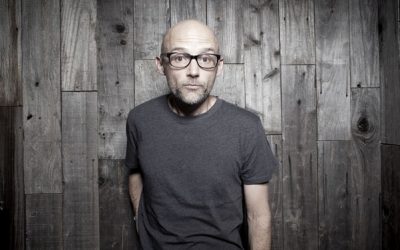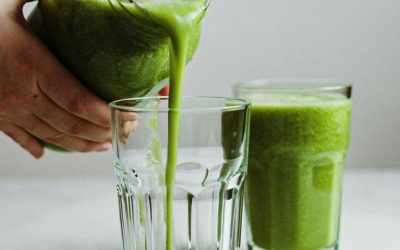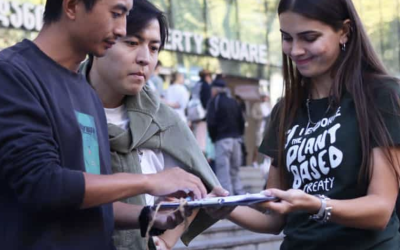Blog
Why the live export of unweaned calves from Ireland should be banned
July 6, 2024
The dairy industry fuels the live export of calves
In 2015 the milk quota in Ireland, set up to avoid overproduction, was abolished. Since then it has been profitable to export unweaned male calves from Rosslare Port in County Wexford, Ireland to Cherbourg in France. Additionally, around 200,000 male calves born into Ireland’s dairy industry are annually exported to the Netherlands or Spain for fattening. They are then either slaughtered for veal or exported again for slaughter elsewhere. More and more dairy bulls are also exported to the Middle East and North Africa as weanlings. The warming climate and water scarcity across the Middle East means that it is cheaper to import animals than to raise them there.
Severe mistreatment and abuse
The calves are taken to live animal markets at around ten days old and soon after they are exported in trucks by ferry to mainland Europe. Male calves have no use to the dairy industry, and they are often sold for only five euros or less. Sometimes they cannot even give them away. The live animal markets are very stressful, cold, damp, and the calves are routinely abused. Many have to stand on concrete flooring. The organization Ethical Farming Ireland documents the market from early in the morning to the evening, witnessing calves without food and at times no water. They are seen licking the walls and trying to suck on the bars. They are often very weak and hungry even before the journey to France begins.
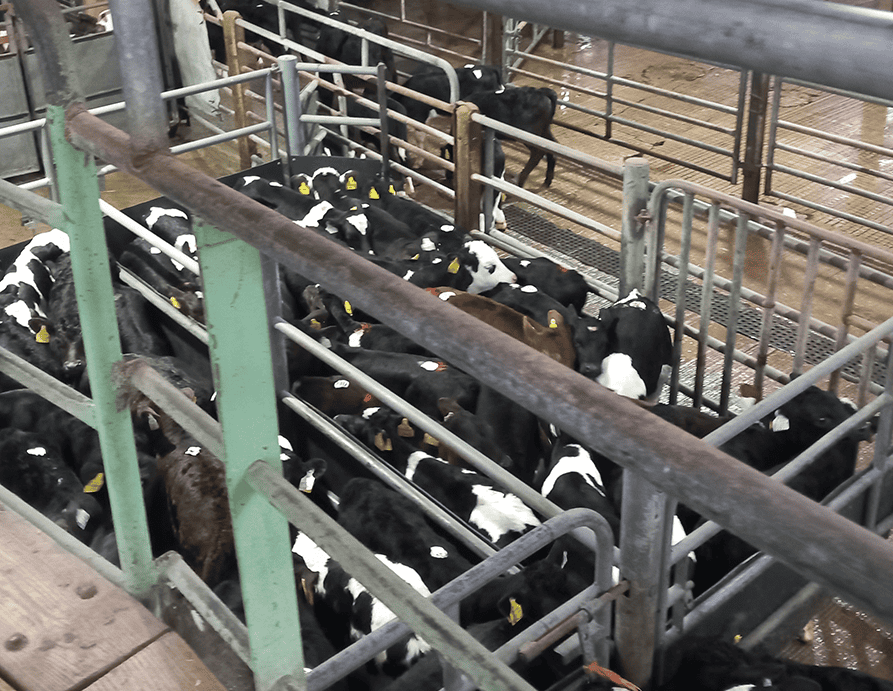
Calves await their fate at market.
Image: Ethical Farming Ireland
Not fed for up to 40 hours
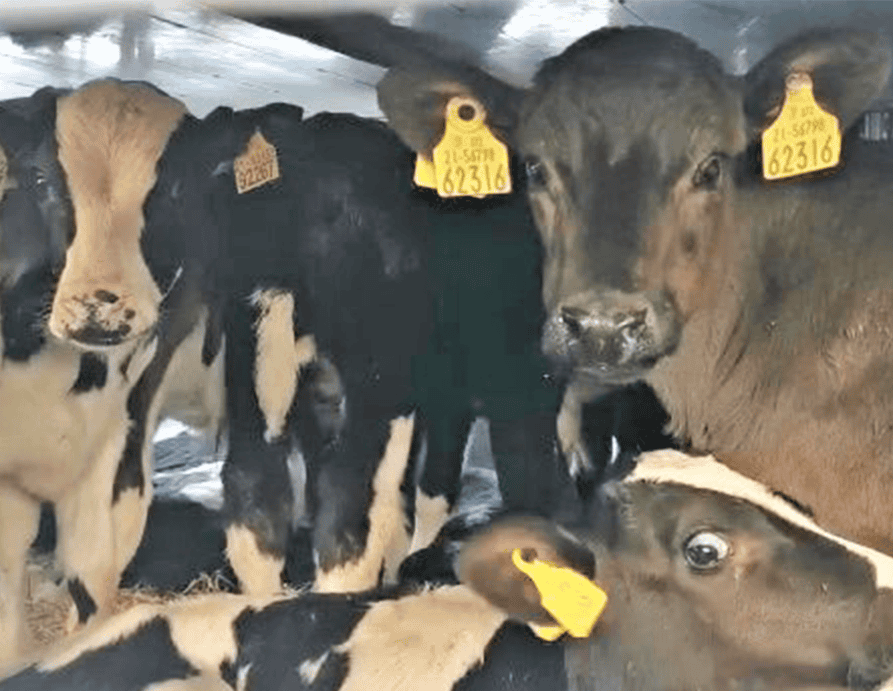
Calves are crammed into trucks and face long journeys.
Image: Ethical Farming Ireland
Around 300 calves leave Ireland jammed into three-story trucks. It is an 18-hour ferry journey from Ireland to France, however, investigations have shown that calves go without food for up to 40 hours in total due to the travel time to and from the ports, loading, and waiting time. The transport legislation is badly written and convoluted, with many derogations. The European Commission has been clear that the calves must be fed after 19 hours, but while the calves are in transport, it’s not possible. The Irish authorities have claimed that feeding is only a recommendation, not a legal requirement.
Abuse at control posts
The French organization L214 has covertly filmed at the control post in Cherbourg, France, on three different occasions in 2019, 2020, and 2023. Each investigation exposed how the calves are being severely abused on arrival in France (link to all investigations done by L214). The control post can hold up to 2,500 calves and the investigations by L214 also showed some calves waiting eight hours or more to be fed. The RTÉ documentary included investigation footage carried out by L214, Eyes on Animals, and Ethical Farming Ireland, which covered the journey of calves transported from Ireland to France and the Netherlands. The rough treatment at the markets was also highlighted.
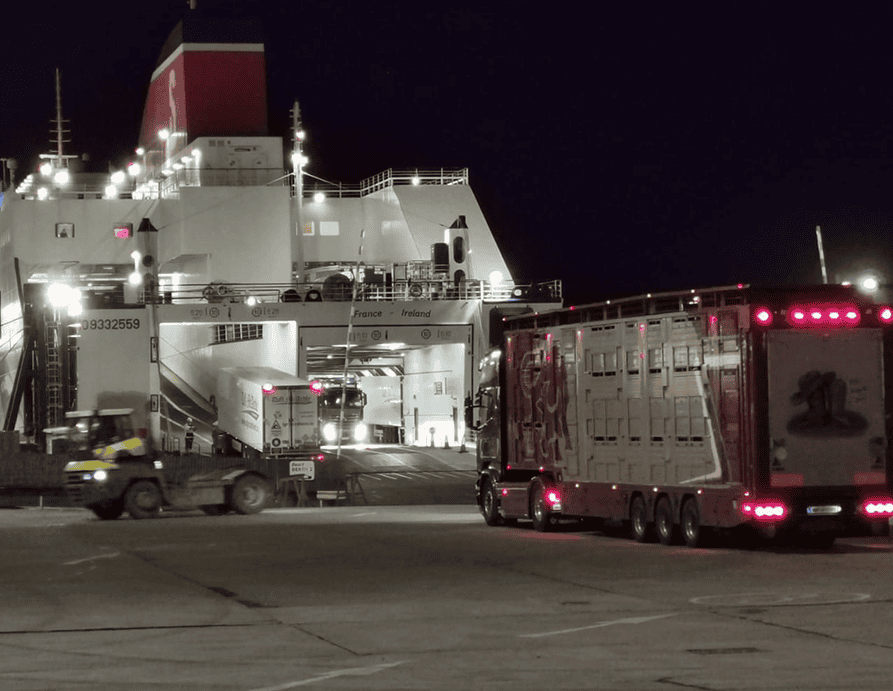
A lorry full of calves in transit.
Image: Ethical Farming Ireland
Trapped in small cages at veal farms
When the calves finally arrive at farms in the Netherlands or Spain, they are trapped in appallingly small cages, destined to be slaughtered for veal. An increasing number of unweaned calves are being exported to Romania and Poland where they are fattened and exported on to the Middle East and North Africa.
Increasing demand on live exports makes big profits – it is crucial to push more countries to ban this cruel industry
The live export trade is a consequence of the rising demand for meat in some parts of the world and companies are profiteering from water shortages and warmer climates across the Middle East. For some countries in Europe, including Ireland, live export is a key part of the farming economy. The Animal Welfare Bill just passed its final stage in the British Parliament. The law will put an end to the live export from the United Kingdom of animals for slaughter or fattening. It will make the UK the first European country to phase out the live export trade.
It is important to put pressure on the Irish government and the EU to stop the cruel live exports of unweaned calves.
Take action for a Plant Based Treaty
Animals are sentient beings and should be treated with kindness, compassion, and respect. Here’s how you can help:
-> The first core principle of Plant Based Treaty, Relinquish includes: “Ban on all live exports”, you can help by living vegan and signing the Plant Based Treaty.
-> Sign and share Animal Save Movement’s petition which calls for the ferry company Stena Line to stop the export of unweaned male calves and to extend the live exports policy they have in the UK to include Ireland. Additionally, it demands the European Commission to follow the lead of the UK´s Bill and introduce an EU ban.
-> Read and share Plant Based Treaty’s Safe and Just Report which examines the upward trend of live exports and what we need to bring the food system into a safe operating space to respect our planetary and social boundaries.
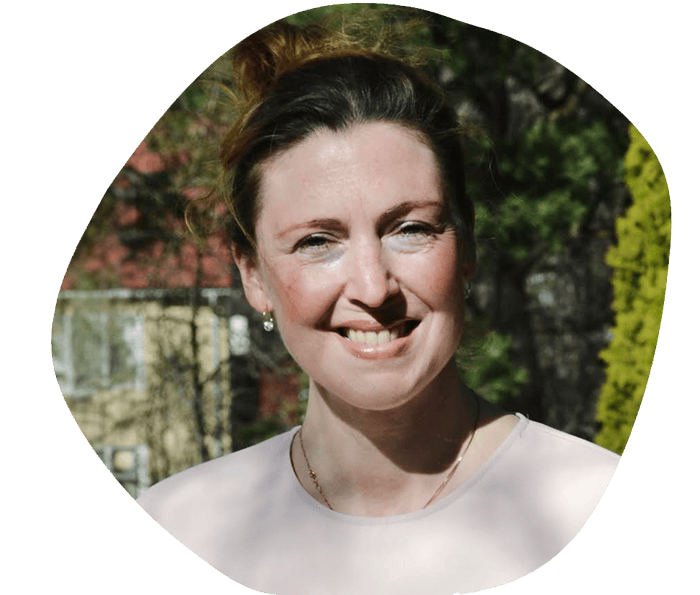
Anne Casparsson is a writer and ethicist, who has worked with communication and journalism in different capacities, for more than twenty years. She writes about animal rights, veganism, sustainability, justice, and peace related issues. Anne is based in Stockholm where she lives with her family. She is a dedicated voice for the animals.

Anne Casparsson is a writer and ethicist, who has worked with communication and journalism in different capacities, for more than twenty years. She writes about animal rights, veganism, sustainability, justice, and peace related issues. Anne is based in Stockholm where she lives with her family. She is a dedicated voice for the animals.
More from the blog
Ten Plant Based Treaty Celebrity Endorsers Making A Difference
By Miriam Porter
Kickstart Spring With A Nourishing Green Smoothie By Dr. Brooke Goldner
By Miriam Porter
From Global Advocacy To Menu Changes: Plant Based Treaty’s Goals For 2025
By Miriam Porter

